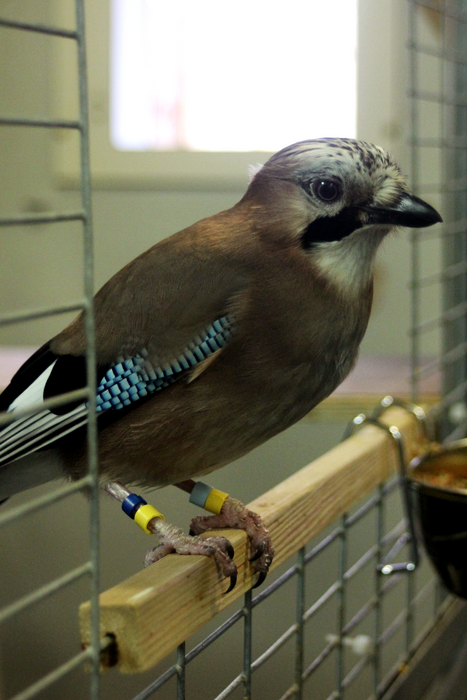A study has found that Eurasian jays can pass a version of the ‘marshmallow test’ – and those with the greatest self-control also score the highest on intelligence tests.

Credit: Alex Schnell
A study has found that Eurasian jays can pass a version of the ‘marshmallow test’ – and those with the greatest self-control also score the highest on intelligence tests.
This is the first evidence of a link between self-control and intelligence in birds.
Self-control – the ability to resist temptation in favour of a better but delayed reward – is a vital skill that underpins effective decision-making and future planning.
Jays are members of the corvid family, often nicknamed the ‘feathered apes’ because they rival non-human primates in their cognitive abilities. Corvids hide, or ‘cache’, their food to save it for later. In other words, they need to delay immediate gratification to plan for future meals. The researchers think this may have driven the evolution of self-control in these birds.
Self-control has been previously shown to be linked to intelligence in humans, chimpanzees and – in an earlier study by these researchers – in cuttlefish. The greater the intelligence, the greater the self-control.
The new results show that the link between intelligence and self-control exists across distantly related animal groups, suggesting it has evolved independently several times.
Of all the corvids, jays in particular are vulnerable to having their caches stolen by other birds. Self-control also enables them to wait for the right moment to hide their food without being seen or heard.
The results are published today in the journal Philosophical Transactions of the Royal Society B.
To test the self-control of ten Eurasian jays, Garrulus glandarius, researchers designed an experiment inspired by the 1972 Stanford Marshmallow test – in which children were offered a choice between one marshmallow immediately, or two if they waited for a period of time.
Instead of marshmallows, the jays were presented with mealworms, bread and cheese. Mealworms are a common favourite; bread and cheese come second but individuals vary in their preference for one over the other.
The birds had to choose between bread or cheese – available immediately, and mealworm that they could see but could only get to after a delay, when a Perspex screen was raised. Could they delay immediate gratification and wait for their favourite food?
A range of delay times was tested, from five seconds to five and a half minutes, before the mealworm was made available if the bird had resisted the temptation to eat the bread or cheese.
All the birds in the experiment managed to wait for the worm, but some could wait much longer than others. Top of the class was ‘JayLo’, who ignored a piece of cheese and waited five and a half minutes for a mealworm. The worst performers, ‘Dolci’ and ‘Homer’, could only wait a maximum of 20 seconds.
“It’s just mind-boggling that some jays can wait so long for their favourite food. In multiple trials, I sat there watching JayLo ignore a piece of cheese for over five minutes – I was getting bored, but she was just patiently waiting for the worm,” said Dr Alex Schnell at the University of Cambridge’s Department of Psychology, first author of the report.
The jays looked away from the bread or cheese when it was presented to them, as if to distract themselves from temptation. Similar behaviour has been seen in chimpanzees and children.
The researchers also presented the jays with five cognitive tasks that are commonly used to measure general intelligence. The birds that performed better in these tasks also managed to wait longer for the mealworm reward. This suggests that self-control is linked with intelligence in jays.
“The birds’ performance varied across individuals – some did really well in all the tasks and others were mediocre. What was most interesting was that if a bird was good at one of the tasks, it was good at all of them – which suggests that a general intelligence factor underlies their performance,” said Schnell.
The jays also adjusted their self-control behaviour according to the circumstances: in another experiment where the worm was visible but always out of reach, the jays always ate the immediately available bread or cheese. And the length of time they were willing to wait for the worm fell if it was pitted against their second most preferred food as the immediate treat, compared to their third. This flexibility shows that jays only delay gratification when it is warranted.
Research by other scientists has found that children taking the Stanford marshmallow test vary greatly in their self-control, and this ability is linked to their general intelligence. Children that can resist temptation for longer also get higher scores in a range of academic tasks.
This research was approved by the University of Cambridge Animal Ethics Review Committee, and performed in accordance with the Home Office Regulations and the ASAB Guidelines for the Treatment of Animals in Behavioural Research and Teaching.
Journal
Philosophical Transactions of the Royal Society B Biological Sciences
DOI
10.1098/rstb.2021.0348
Method of Research
Experimental study
Subject of Research
Animals
Article Title
Waiting for a better possibility: delay of gratification in corvids and its relationship to other cognitive capacities
Article Publication Date
30-Oct-2022




